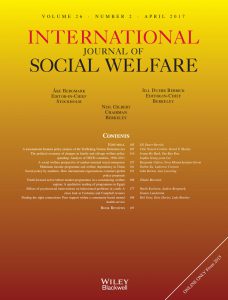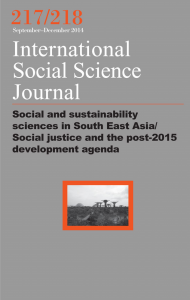Risking safety and rights: online sex work, crimes and ‘blended safety repertoires’

Like all areas of life, the sex industry has been massively affected by the dominance of the internet and digital technologies which now is the main mechanism for advertising, marketing and organizing how sex is sold. In our project, Beyond the Gaze, there has been some intriguing findings which tell sociologists a lot more about the practices of online sex workers. Notably we found, as reported in the British Journal of Sociology, that the internet makes sex work safer. Primarily this is because there are some very clear ways in which sex workers can utilize online tools to check customers, find out information about safety, share knowledge and online spaces used for advertising where customers leave some sort of digital trace which may deter some who may target sex workers. Our concept of the ‘blended safety repertoires’ demonstrates how sex workers are using old style precautions, deterrents and protection mechanisms which are now merged with more digital tech and online methods of checking and keeping safe.
Our partners, National Ugly Mugs (‘NUM’), deliver a key mechanism for sending out information to keep sex workers safe, whether this is generic information about working safer or specific information about crimes that have been committed and safety alerts which warn about individuals to be wary of. Such a service, working hard to battle the difficulties of a third sector charity organization, provides a vital line for sex workers, many of whom work in isolation. Sending out thousands of alerts to their members each year and offering a third party reporting scheme, NUM are working at the frontline of sex worker safety.
The internet is so important for safety and provides a wealth of opportunities for sex workers to gather online, like the ‘water cooler’ of the office, sex workers can communicate in open and closed private groups through forums and social media platforms to share safety information, advice, access buddying schemes, access peer support and find out about their rights at work. These positives elements of online organizing demonstrated by the sex work community is a testament to the technological abilities and savviness of sex workers, especially when working in a system like the UK where quasi-criminalization makes their lives harder. Not being able to legally work together and the stigmatization of sex work are major barriers to open organizing and collective working. The brothel keeping and other laws such as ‘control for gain’ also mean that legitimately and openly having a third party involved in organizing their work practices or place of work is not possible, pushing sex workers who do use third parties such as managers and receptionists into illegality.
Our findings have highlighted how online technology and the practices of online sex work can enhance safety yet during the impact and dissemination year of our project profound changes took place to US laws which fail to recognize this. Amendments to law passed in the US Congress in March 2018, in theory to address ‘sex trafficking’ the Fight Online Sex Trafficking Act (FOSTA) and the Stop Enabling Sex Traffickers Act (SESTA), make websites liable for what users say and do on their platforms. This is already having huge ramifications for US independent sex workers as platforms make changes in relation to adult commercial content prior to the law being enacted in 2019. This is seeing a range of detrimental impacts including damage to livelihood and safety. These have included; the closure of major platforms or areas of platforms where sex workers have advertised for reasonable prices e.g. Backpage and Craigslist, curtailing the income of sex workers heightening poverty with some unable to pays rent and bills. This has included changes to terms and conditions on some spaces which now prohibit sex worker peer support and information sharing vital for screening and safety. This has also meant health, outreach and support projects having to remove information and advice whilst they consider whether this would be in breach. Indeed in the UK not only individual sex workers but also sex work support and safety schemes are having to review their online content and data management, as some may be using platforms with US jurisdictions. Sex work support organisations and sex worker rights organisations in the USA predict; increased dependence on third parties including exploitative ones, an increase in street work, reduced screening, an increase in violence against sex workers, voluntary sex work moving into more illicit even less visible spaces (including the dark net) and making it harder for law enforcement to identify none voluntary prostitution and cases of trafficking. US academic researchers Professor Scott Cunningham et al (2017) have analysed meta data on the shift to online sex work in the USA and found a reduction in murder and other violent crime against sex workers, they recommended laws such as FOSTA and SESTA which would curtail online advertising and screening would risk reversing such trends.
Online sex workers hold their breath at the possibility that such law could be introduced in the UK jeopardizing their safety and livelihoods. August 2018 saw The ‘All Party Parliamentary Group on Prostitution and the Global Sex Trade’ call for SESTA/FOSTA type laws and the criminalization of purchasing sexual services. The APPG is not a group formally appointed by government to review law in this area, but a self-appointed group, in this case one who frame all sex work as ‘sexual exploitation’ and advocate for laws making it a crime to pay for sexual services. Their latest report was meet by protests outside the House of Commons from sex worker rights organizations who support the decriminalization of sex work and also lead to academics expressing concerns that key research evidence had been ignored.
Whilst SESTA/FOSTA type laws have not been introduced in the UK to date some of the discourses which surround it have already trickled down to the UK. Beyond the Gaze found that the primary lens through which UK policing was engaging with online sex work, was that of modern slavery which had been a national priority during the course of Beyond the Gaze, and adult website platforms were under increased scrutiny from law enforcement. Amongst police forces who took part there appeared generally to be less awareness of the independent nature of much online sex work and how modern slavery related policing activities can impact on independent sex workers.
Yet there was no support for the prohibition of online advertising spaces amongst police who were concerned this would; make it more difficult to identify victims and investigate those who exploit sex workers and would displace advertising with the sector moving further into the hands of individuals and organisations that were not visible legal companies, possibly onto the dark net, making it even more challenging for police forces and more exploitative for sex workers.
Current law prevents individuals working together legally, mitigates against the legitimate status of independent self-employed sex workers and prevents existing employment law, health, safety and other regulatory frameworks being applied and further developed as protective measures for sex work. This is an adverse regulatory framework and is jeopardizing the safety of sex workers, despite the clear advances to safety provided through digital technologies. On balance of current evidence decriminalisation offers the best framework to tackle the issues of sex worker safety and rights, including access to protection from violence and other crimes to provide a base from which to challenge stigma and discrimination and to begin to address labour rights.
Campbell, R. , Sanders, T. , Scoular, J. , Pitcher, J. and Cunningham, S. (2018), Risking safety and rights: online sex work, crimes and ‘blended safety repertoires’. The British Journal of Sociology. doi: 10.1111/1468-4446.12493
Teela Sanders is Professor of Criminology at University of Leicester
Rosie Campbell,is Post Doctoral Research Fellow – ESRC White Rose Doctoral Training Partnership , Social Policy and Social Work, University of York






1467-7660/asset/DECH_right.gif?v=1&s=a8dee74c7ae152de95ab4f33ecaa1a00526b2bd2)